Ludwig Van takes a peek behind the pews of Toronto’s vibrant church music scene. “You don’t need to believe in God to come”, says John Tuttle.

Classical religious music is alive in Toronto, and while you might be most familiar with it performed in concert halls, it’s happening in the city’s churches as well. If fans seek this music out in Toronto’s churches, they’ll encounter it in the context it was originally written for, and in a space that suits it perfectly.
Toronto Consort member Katherine Hill believes trying to experience liturgical music at church in addition to the concert hall is important. Concerts can sometimes become “merely aesthetic,” she says, and this can diminish the power of great music.
“I do think that a concert performance of something like the Monteverdi Vespers makes the music available to many people who otherwise wouldn’t go to church,” she says, “and very few churches on the planet could afford to hire all the specialized singers and instrumentalists for an actual Vespers. So a concert version can be a great thing.”
“But I feel that with a lot of the early repertoire I do, both sacred and secular, a concert context is counter-intuitive. Historical performance practice was developed in the last century by classical musicians, and we somewhat unconsciously use that concert model, in which performer and audience are totally separate entities, and performers dress up and have to be ‘perfect.’ This often seems like the wrong frame to put around the picture.”
A church service, she thinks, can be a better frame. “To me, there is a deep reward in doing and hearing music in its liturgical context. Something is more complete that way.” In concert settings, “people don’t know why certain texts are being used, or what they might mean, and then the experience is merely aesthetic. I think liturgy can offer something deeper.”
John Tuttle, another central figure in Toronto’s Church music scene, agrees. Tuttle retired as organist and choirmaster at St. Thomas’ Anglican Church on Huron Street after serving in the role for 27 years. He’s also the director of music at Trinity College, U of T, a position he intends to keep.
“There are a few parishes in Toronto which try very hard to do good music, what you might call art music, as opposed to entertainment music,” Tuttle says. “I think music in worship falls into those two camps, either music which is artistically and liturgically beautiful or music that is meant to entertain the congregation. We don’t do music to entertain anybody here,” he adds with a smile. Other examples of churches with strong music programs are St. James Cathedral (at the corner of King & Church Streets) and St. Mary Magdalene (477 Manning Avenue), Tuttle says.
But not all churches have the same philosophy when it comes to music. Many have turned their back on the rich tradition of church music in favour of more easily digestible fare. “Vatican Two was grossly misinterpreted to mean everything should be dumbed down to the lowest common denominator,” Tuttle says.
The result was that good liturgical music came to be almost exclusively found in concert settings. “That’s the only place people heard it for a long time,” Tuttle says. “I remember doing performances of the Fauré Requiem and the Duruflé Requiem, and it was always in a concert context. But I’ve also done the Duruflé Requiem here [at St. Thomas’s] as an All Souls Day Requiem, and it’s a whole different piece when you hear it in the context of liturgy, as is any mass.”
“We’ve done Palestrina masses, Vaughn Williams masses. We do the Kodály mass here. All of which have had lots of airtime in concerts, but when you hear them in the mass, you hear them in a different way.”
Toronto’s churches offer a quiet, contemplative space in which to encounter great music. Away from the hustle and bustle of the concert hall, and without its pretensions, they afford a space where the music becomes the sole focus instead of the performers.
If this isn’t enough to get you out of bed on Sunday morning, also remember that churches are free, and you don’t need to be religious to attend. “To hear this superb music in the context of the liturgy is really the best way, even if you’re not religious,” says Tuttle. “You don’t need to believe in God to come and just let [the music] wash over you.”
- FEATURE | Beyond The Concert Hall: Toronto’s Church Music Scene - November 22, 2018
- FEATURE | Where To Buy Classical Vinyl In Toronto - December 9, 2016
- SCRUTINY | A Cult Novelist Makes Great Conversation With Former TSO Conductor Seiji Ozawa - October 31, 2016



